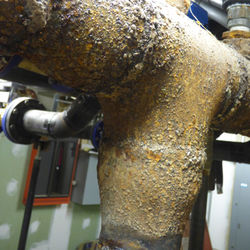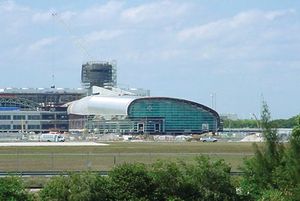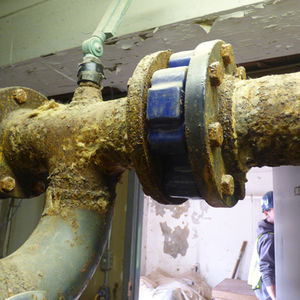By Tim Ledden - Armacell Technical Manager-Insulation
Controlling Condensation and Reducing CUI is a Top Priority in Miami International Airport’s humid climate
Humidity poses a high risk potential for CUI
 Humid climates are notorious for corrosion problems in buildings, driving up costs for owners in repairs. Corrosion is particularly common in HVAC equipment because these systems operate below the ambient temperature for much of the year making condensation a huge source for moisture. Clearly this problem considerably reduces the service life of mechanical systems and causes more frequent shutdowns and overhauls. This corrosion problem is commonly referred to as corrosion under insulation or CUI. One prevention method for controlling CUI due to condensation is properly insulating mechanical systems and pipework. The difficulty is finding a cost-effective insulation for cold lines that will prevent condensation even in high humidity climates.
Humid climates are notorious for corrosion problems in buildings, driving up costs for owners in repairs. Corrosion is particularly common in HVAC equipment because these systems operate below the ambient temperature for much of the year making condensation a huge source for moisture. Clearly this problem considerably reduces the service life of mechanical systems and causes more frequent shutdowns and overhauls. This corrosion problem is commonly referred to as corrosion under insulation or CUI. One prevention method for controlling CUI due to condensation is properly insulating mechanical systems and pipework. The difficulty is finding a cost-effective insulation for cold lines that will prevent condensation even in high humidity climates.
It’s all about conditions
Effectively insulating cold surfaces is particularly difficult in humid climates because high vapor pressure provides a driving force for water vapor to penetrate through the insulation and make its way to the cold, metal surface where it will condense and corrode the metal. Therefore, the insulation must have an effective barrier that stops the water vapor even when subjected to the high vapor pressure of humid climates. Without this barrier, condensation will form on the metal surface and CUI is inevitable.
Better Solution
There are a wide range of products available to insulate cold surfaces; however, selecting the wrong insulation, especially in high humidity climates, can lead to disastrous consequences from CUI. Highly permeable insulation, like fiberglass, must use a separate vapor barrier applied to the surface of the insulation to prevent condensation and CUI. These barriers are very thin and easily damaged and one exposed section of the insulation can compromise the entire insulation system due to the moisture wicking action of the fibers. In addition, paper all service jackets (ASJ) are often used as a vapor barrier over fiberglass. If the outer surface of the ASJ gets wet, as insulation surfaces often do in humid climates, it will soak up the water and lead to mold over time. Low permeable insulation, like closed-cell AP Armaflex®, can block the water vapor from making it to the pipe without a separate vapor barrier. Therefore, damage does not occur as easily and, because Armaflex does not wick moisture, any damage will be localized to one spot. Also, Armaflex does not absorb water so surface moisture will not soak into the insulation. This, along with Microban® antimicrobial technology incorporated into the composition of Armaflex, makes mold growth in the insulation nearly impossible.
Costs less, easier to install, and impervious to moisture
 Miami International Airport (MTI) recognized the challenges in insulating cold pipes in Miami’s extremely humid climate when it came to selecting insulation for the condensate piping serving its 52 air handlers at the new Concourse J terminal. Initially, cellular glass was specified but suggestions were made to the owner which could save money and still deliver the performance MTI demanded.
Miami International Airport (MTI) recognized the challenges in insulating cold pipes in Miami’s extremely humid climate when it came to selecting insulation for the condensate piping serving its 52 air handlers at the new Concourse J terminal. Initially, cellular glass was specified but suggestions were made to the owner which could save money and still deliver the performance MTI demanded.
AP Armaflex pipe insulation was suggested as a cost-effective alternative to cellular glass. With extremely low water vapor permeability and water absorption, AP Armaflex could provide the necessary performance even without a separate vapor barrier. A critical consideration for the airport was Miami’s summer humidity ranging from 85-100% throughout Miami’s cooling season. These conditions create a very high vapor pressure which would try to force water vapor through the insulation where it would condense on the pipe. Fiberglass, while less expensive than both Armaflex and cellular glass, would not be suitable, because the easily damaged vapor barrier would make water intrusion inevitable.
AP Armaflex tubing was also preferred because its flexibility made it extremely easy to install. The material could easily be slid onto long runs of piping requiring minimal cuts and joints. This makes it ideally suited to condensate drains, which typically have many bends. Therefore, installing a non-flexible material like cellular glass would be very labor intensive.
The cost savings over foam glass were significant. It was estimated that the airport saved approximately $25,000 by installing closed-cell foam instead of foam glass. Many engineers involved in the Miami Concourse J project, agreed that AP Armaflex was smart, value-engineering.
Proper installation is the key
 After the proper insulation material is selected, proper installation is crucial to prevent CUI. Completely sealing the insulation prevents moisture from condensation and subsequent corrosion on pipes. It’s critical to be educated about proper installation to ensure long lasting service on mechanical systems, maintaining thermal performance, and energy savings for years to come. MTI recognized this and made sure to hire contractors that had been trained in Armacell’s Quality Installers Program (AQIP). This program is free to contractors and gives them the opportunity to learn how to install Armacell insulation properly from the installation experts at Armacell. This way, the building owners and engineers can rest assured that the job was done properly and the system will operate efficiently without the threat of CUI.
After the proper insulation material is selected, proper installation is crucial to prevent CUI. Completely sealing the insulation prevents moisture from condensation and subsequent corrosion on pipes. It’s critical to be educated about proper installation to ensure long lasting service on mechanical systems, maintaining thermal performance, and energy savings for years to come. MTI recognized this and made sure to hire contractors that had been trained in Armacell’s Quality Installers Program (AQIP). This program is free to contractors and gives them the opportunity to learn how to install Armacell insulation properly from the installation experts at Armacell. This way, the building owners and engineers can rest assured that the job was done properly and the system will operate efficiently without the threat of CUI.
Read more about the Miami Airport Job Story here.
